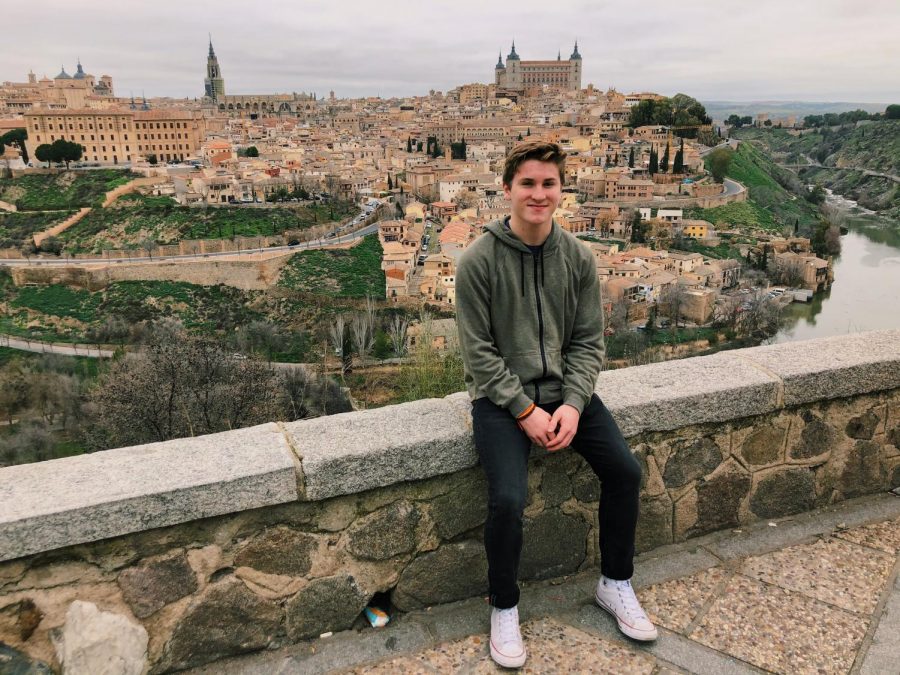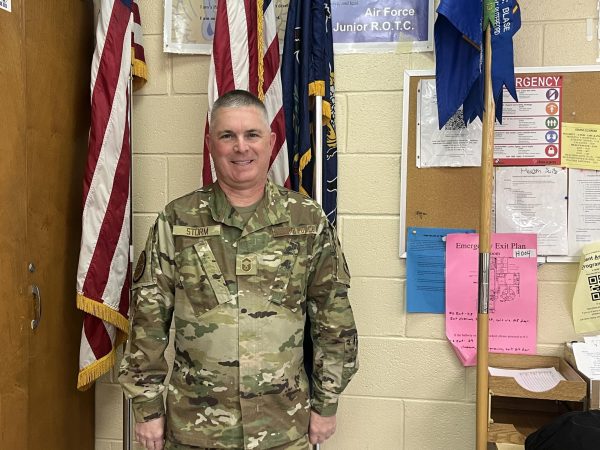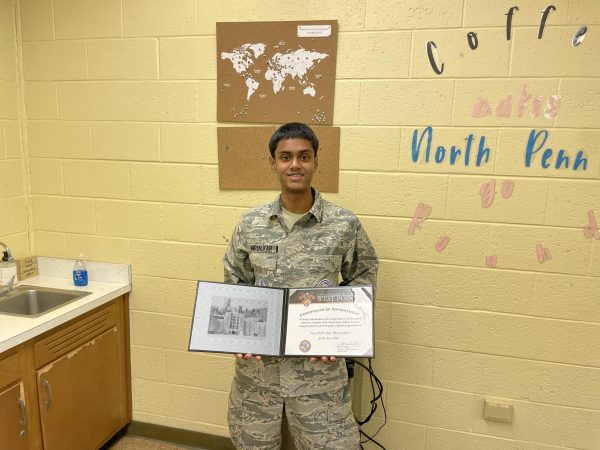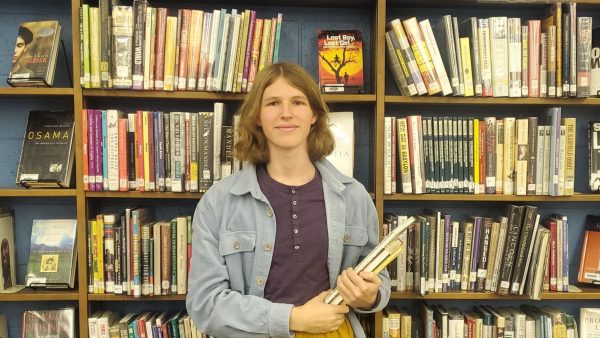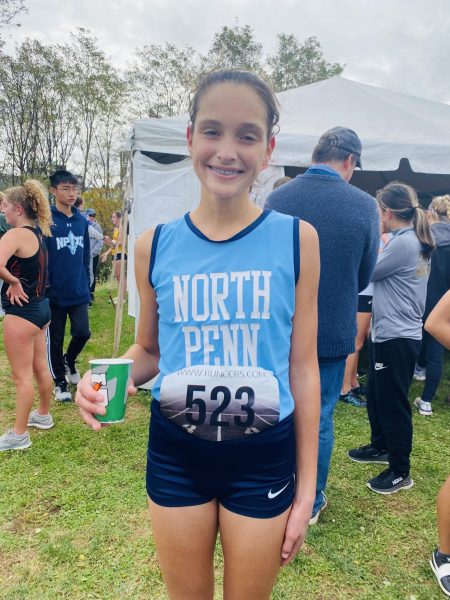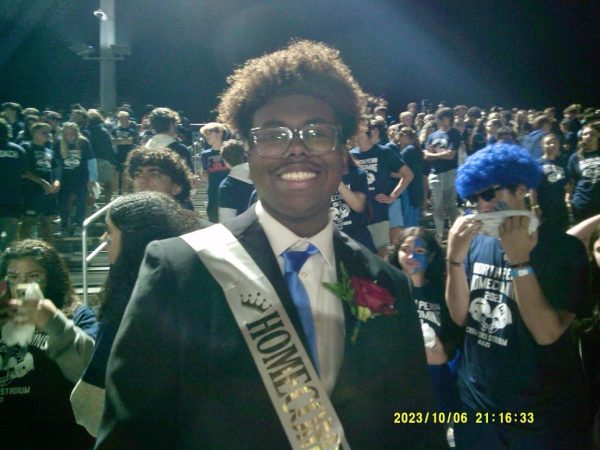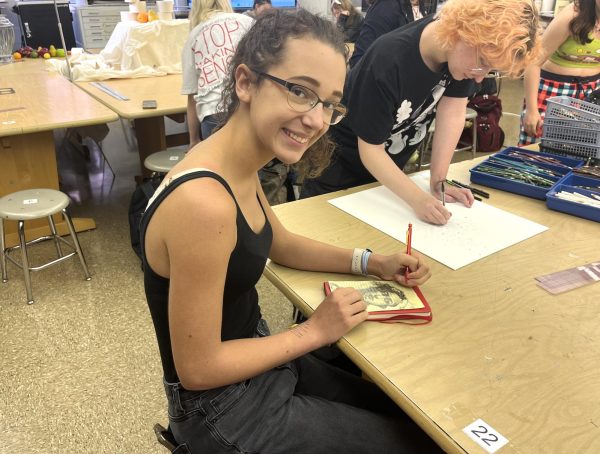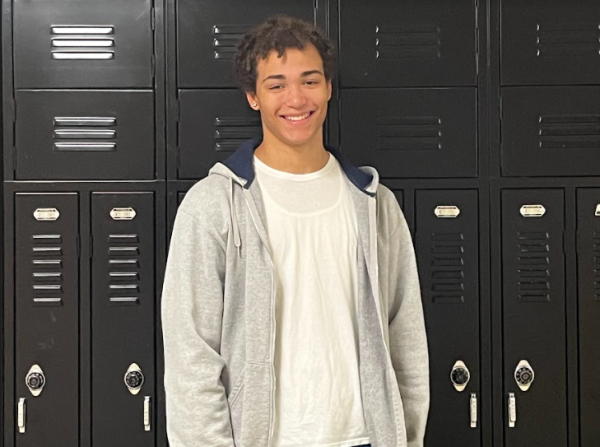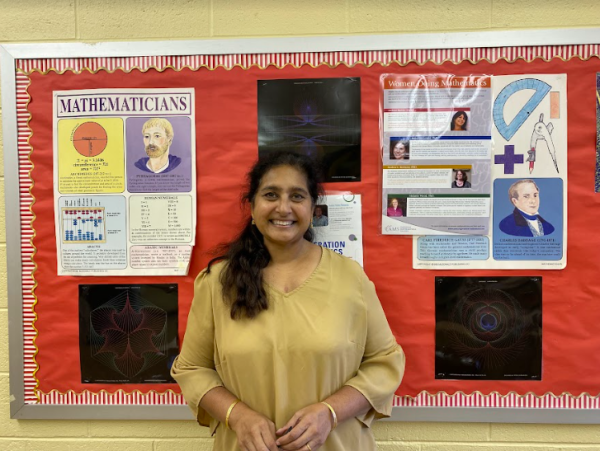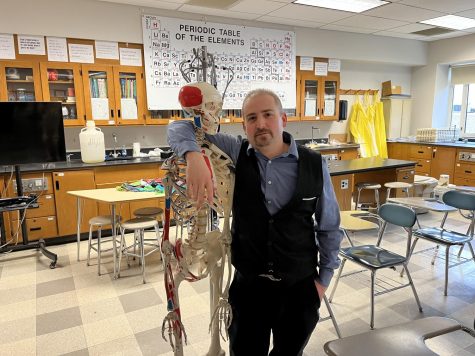An abrupt goodbye, but a long lasting memory
Burgoyne was given a once in a lifetime opportunity, but it was cut short due to COVID-19
TOWAMENCIN — North Penn High School junior Matthew Burgoyne only had about 15 hours to pack his things and leave Madrid, Spain. Despite having to leave so soon, he had the chance to experience one of the greatest opportunities handed to him.
Burgoyne wanted to study abroad to immerse himself in a different culture and improve his Spanish. When he found that he was chosen to go to Madrid, he was excited to live his life from a different perspective.
“I was excited, but I knew that I was going to miss my friends and family. I was also looking forward to all of the cool things that I would be doing and seeing in Spain,” Burgoyne said.
When he arrived in Spain, he felt that it was hard to adjust, mostly because the time zones were different. In Spain, they’re 6 hours ahead of the United States.
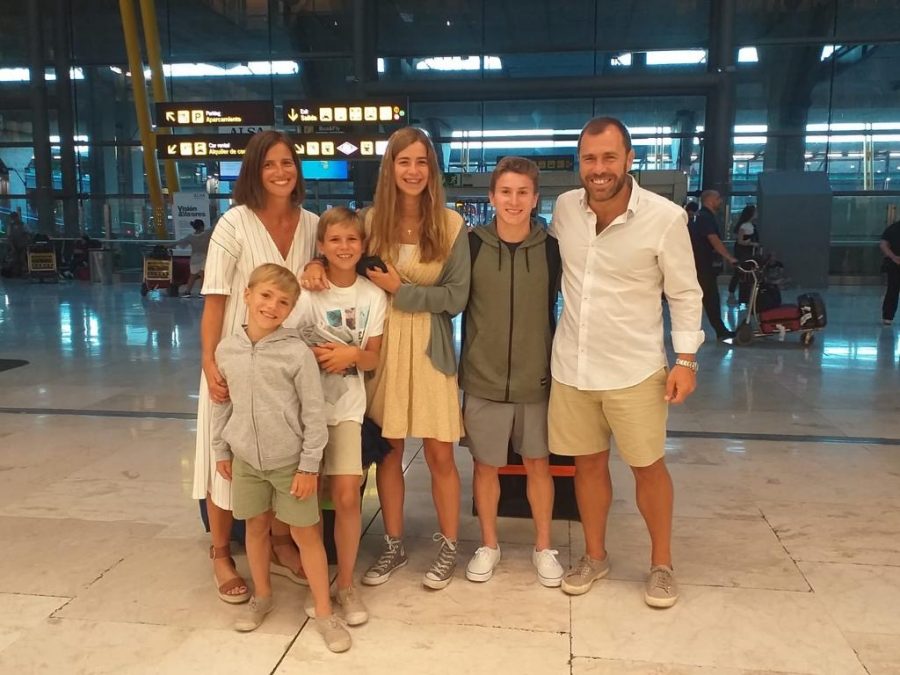
The first day Burgoyne got to meet his host family at the airport.
“The first day was crazy because when I arrived in Spain, it was early in the morning, but it felt like dinner time. As soon as I got to my [host family’s house], I think I slept for 10 hours, and it was like that for the whole week,” Burgoyne said.
It was the first time he got to meet his host family because they never video chatted prior to him coming. His host dad was a member of the Spanish Navy and his host mom was a teacher at his school. He had 3 host siblings whose names were Claudia who was 14, Manolo who was 11, and Pedro who was 7. Carlota, who was the Spanish exchange student at North Penn, was also a part of the family.
“My first impression was great—[his host family] were really awesome people. When I stepped out of the airport, they had a big sign that said, ‘Welcome,’” Burgoyne said.
During that week, he went to meet his host family’s grandparents and they stayed at the beach for the weekend.
Although he took 3 years of Spanish which helped him understand the basics and how to get around, getting used to a different lifestyle was one of the obstacles he had to overcome.
“Being immersed like that in the lifestyle, it completely changes everything because everyone is talking faster and everyone has different accents. It’s just a whole different level. I think the first time someone spoke Spanish to me was right off the plane, and she was asking for my passport and I had no idea what she was saying to me. There were a lot of awkward moments,” Burgoyne said.
Burgoyne began school the next week. He attended a religious school that covered all religions, and classes went from 8:45 AM to 5 PM. He had an hour and a half lunch break in the middle of the day where he would do whatever he wanted to do.
He had less classes to choose from because most were required. He was considered a sophomore, so he took a biology class, a combined physics and chemistry class, a math class that covered various types of math like algebra or geometry, a philosophy class, a religion class, a history class, a Spanish class that was essentially a language arts class, and a basic English class.
As for how the material was taught, there was a lot of memorization and there were rarely multiple choice tests, so you would have to apply your learning through short answers.
A school year typically lasts from September to June. After the school year ends, students who failed the year could spend two weeks doing activities to redo tests in order to pass the course.
Compared to North Penn, there were about 130-150 students in his grade. They also switched classes less often because the teachers would come into their classroom when it was their time. His school also wasn’t big on sports. There were only 3 or 4 team sports, but they weren’t on a competitive level; they were mostly club sports. Also, the food, in his opinion, was much better.
Burgoyne didn’t have to follow a strict dress code; he just couldn’t wear sweatpants or shorts. Students were required to dress nice, but overall, everyone dressed nicer in Spain anyway.
Every morning, he would take public transportation to school and on Mondays and Wednesdays, he would go on the metro after school to the gym to continue doing gymnastics, and then he took it home. On Fridays, he got out of school early at around 2.
“Public transportation was key to getting around the city. It was nice because you could go anywhere you want. Other than that, on weekends, I would go out with friends sometimes. Some weekends, my host family would do day trips to different places,” Burgoyne said.
Making friends was hard at first because everyone already knew each other and he was the outsider. The language barrier also made it difficult because he wasn’t very good at Spanish and not everyone’s English was very good.
“The first week, everybody came up to me and was like, ‘Are you the American? What are you doing here?’ It was a little weird, but after that, things got a little normal. It was another obstacle I had to overcome,” Burgoyne said.
When he did start to make friends, he began hanging out with them outside of school like every teenager would. They would hang out on Saturdays at each other’s houses or go to a local park where everyone at school would go to.
He felt homesick at times, but on holidays, he felt that it was rougher than usual, however, he kept in touch with his friends, family, and coaches through Facetime, WhatsApp, and Snapchat.
“I missed everyone, but I was happy that I was there. I never once regretted not going to Spain,” Burgoyne said.
I missed everyone, but I was happy that I was there. I never once regretted not going to Spain.
— Matthew Burgoyne
As with any home, there were rules, but they weren’t as different compared to what it was like at home for Burgoyne. He had to clean his room and make his bed every morning. One thing that stuck out to him was how they ate.
“With every meal, you got a little piece of bread and you use it as a utensil. You would push the food with your bread onto your fork and eat it that way,” Burgoyne said.
Other things that were different were how the people dressed. Everyone dressed nice in Spain and it wasn’t like in America where you would hop into sweatpants and call it a day. He also noticed that everyone stays up extremely late often, and his family would have dinner at 11 PM sometimes.
There wasn’t a specific day when Burgoyne realized that he felt like he was fluent in Spanish. Each day, he knew he was improving.
“Around Christmas time I wasn’t fluent. I just started to understand the gist of what people were saying to me. Before Christmas, I would sit in school and not absorb the things the teachers were saying. After Christmas break, when we went back to school, that’s when things started to kick in a bit and I started to understand and talk better. After I hit that point of basic understanding, that’s when my understanding skyrocketed. Growth started rapidly increasing at that point,” Burgoyne explained.
Burgoyne loved Madrid for its culture and beauty.
“I loved the city—I loved living in that city. Even just walking around the city every time, I would think it was so cool. The food was pretty awesome too. I’m not much of a fish guy and there’s a lot of fish in Spain, so I never took part in that. I also enjoyed the culture. Everybody was so close with each other. That was definitely weird at first, but after a while, I got used to it. Everyone is just so friendly with each other,” Burgoyne explained.
During the holidays, Burgoyne celebrated a few new traditions with his host family that were different than what he would do at home.
“On Christmas Eve, as soon as the clock hits midnight, everybody would go around in a circle you could either choose to sing a song or say what you were thankful for and it just goes around the whole circle for the rest of the night, so I thought that was really cool,” Burgoyne mentioned.
Other than that, Christmas was celebrated relatively the same; he would open presents and visit extended family to have lunch.
They also celebrated Three Kings Day which occurs on January 6th.
“In every single city in Spain, there’s a parade and they go marching down the street. It’s a big holiday for all of the little kids to roll up on the side of the street and cheer and they throw candy at the kids. The next morning, there’s a bunch of presents all over the place,” Burgoyne said.
One of the most traditional Spanish food is paella which is a rice dish that he ate often and he grew to love it. His family got him a Spanish cookbook for Christmas, so if he’s ever craving the food he had there, he could make it.
Burgoyne never left to visit any other countries near Spain, but there were so many places to visit that he didn’t need to.
Every single city and town is so different from each other. It feels like you’re in a different country every time you visit a new place.
— Matthew Burgoyne
“Every single city and town is so different from each other. It feels like you’re in a different country every time you visit a new place. One day, my host family and I went to Toledo which is in the province of Madrid but an hour south. It was so different from the city. It was like in medieval movies where it’s a big town with castles on a hill. There’s a lot of history, so all of the history comes out in the towns and the villages. Each town has its own story. For a class trip, we went to Granada for a week which is in the south of Spain. I was with my classmates for about 4 days. Granada is special because that whole area used to be claimed by the Arabs, so all that Arabian culture is prominent in the old town—the architecture has a bunch of Arabic symbols. It was such a cool place,” Burgoyne explained.
When his family from home came to visit around New Years Day, they stayed for a week and went to Barcelona.
“They came right to Madrid and we stayed there for about 4 days. I showed them around the city and I showed them my favorite spots. We went to some cool restuarants and they got to meet my host family, so it felt like a crossover episode like the one from iCarly and Victorious. It was odd but cool at the same time,” Burgoyne said.
Some of his best memories involved food. He loved going to different restaurants in the city, and since they were so many of them, he got to try out plenty. He also met up with other exchange students from other parts of the U.S., Finland, Switzerland, and New Zealand towards the end of his trip.
“Every weekend, I would be with those guys and especially since we were all a bunch of tourists, we would tourist things. We went to all of the hot spots in Madrid and went to all of the crowded cafes,” Burgoyne said.
To this day, Burgoyne is still in touch with all of the friends he made. He’s in a large group chat with his classmates and is somewhat in communication with all of his other exchange friends because they’re all on different schedules since they’re from different countries.
Everything was normal. Nobody was freaking out. But 3 days later, I checked it and it said that there were 90 cases. That’s when I knew that something bad was going to happen.
— Matthew Burgoyne
When the news about COVID-19 started going around, it wasn’t as big of a deal for everyone in Spain because there were little to no cases.
“Everything was normal. Nobody was freaking out. But 3 days later, I checked it and it said that there were 90 cases. That’s when I knew that something bad was going to happen. They were pretty quiet about it at school-nobody really said anything,” Burgoyne said.
It was a Monday night when his school was shut down.
“That was the first time they did anything about the coronavirus. They put hand sanitizer in every single classroom and they had a poster that said the common symptoms of coronavirus and how to avoid it. That was the only time they said anything about the virus, and later that night, they shut everything down. They said that all schools and government institutions would be shut down for 15 days. That’s when things started to get weird because I started to think that if I was not going to be at school, I don’t know how long this was going to last. The numbers were increasing insanely fast. It went from 90 to 600 in 5 days. When it started to increase, we began to question if I should even be [in Spain] right now because it’s only going to get worse. But honestly, in Madrid, you wouldn’t be able to tell anything was happening. Everyone was still on the streets and everyone was still using public transportation as if nothing was happening. It was the weirdest thing. You would see it on the news and the media would be freaking out about this coronavirus, but the streets of Madrid was like any other day,” Burgoyne said.
But honestly, in Madrid, you wouldn’t be able to tell anything was happening. Everyone was still on the streets and everyone was still using public transportation as if nothing was happening. — Matthew Burgoyne
After school was shut down, students had online school, and on Wednesday, Burgoyne got a call from his parents telling him that he should go home.
“I just woke up, so I was insanely disoriented and I didn’t know what was coming. They started to look for flights and later that day, they booked a flight for the next day. For the span of 15 hours, I found out I was leaving the next day, I packed my bags, I went to sleep, and I left to go home the next morning, I never got to say goodbye to everyone. It all happened so fast, it didn’t kick in. I didn’t even realize that I was leaving Spain for good,” Burgoyne said.
Burgoyne didn’t want to leave, but he knew it was for the best. He was supposed to come home on June 9th.
“I didn’t want to leave before that or after that. I wanted to be home on June 10th. Finding out that I was going to be sent home was disappointing. I never had time to think about it. When I landed in the U.S., it didn’t feel like I left Spain. I just wasn’t in that mindset. I didn’t expect it to go so fast,” Burgoyne said.
When Burgoyne came back to the United States, he stayed in Florida because his dad was there for work. He normally works in Florida for the entire month of March every year and since his mom didn’t have anyone to look after, she also went with him. He stayed there for 3 weeks.
Now that he’s back in Pennsylvania, he’s doing online school like every other student. He’s only taking two semester classes which are Economics and Sociology, so it’s relatively easy. Besides schoolwork, he’s been trying to find other things to occupy his time like cleaning his room and watching TV.
Even now that he’s back, he can’t go back to normal life because everyone is in quarantine.
“It’s good to be back. I haven’t seen any of my friends, so I can’t wait to see them,” Burgoyne said.
Although his trip was shorter than what he expected, he still managed to get a few things out of it.
“In order to find out if you like something, you just do it. The more you do, the more opportunities you get for yourself,” Burgoyne said.
If you’re ever presented with an opportunity like this, you should take it because when will you ever get an opportunity like this again. The things you learn from taking opportunities like this, you can’t compare it to anything else.
— Matthew Burgoyne
“I’ve never experienced a different culture like this before. I’ve never immersed myself fully. I have traveled outside of the country before, but when you’re in a different country for a week, you never really get to see what that culture is all about or what that country is all about. To see that different side of the world, that’s very interesting and I would do that all over again. If you’re ever presented with an opportunity like this, you should take it because when will you ever get an opportunity like this again. The things you learn from taking opportunities like this, you can’t compare it to anything else,” Burgoyne added.


